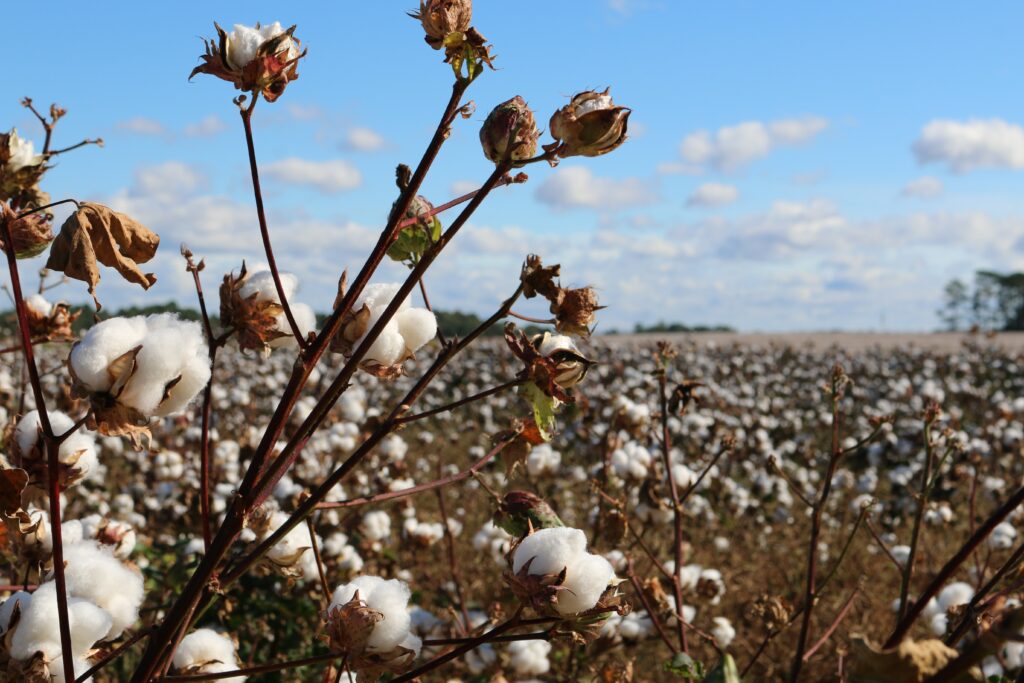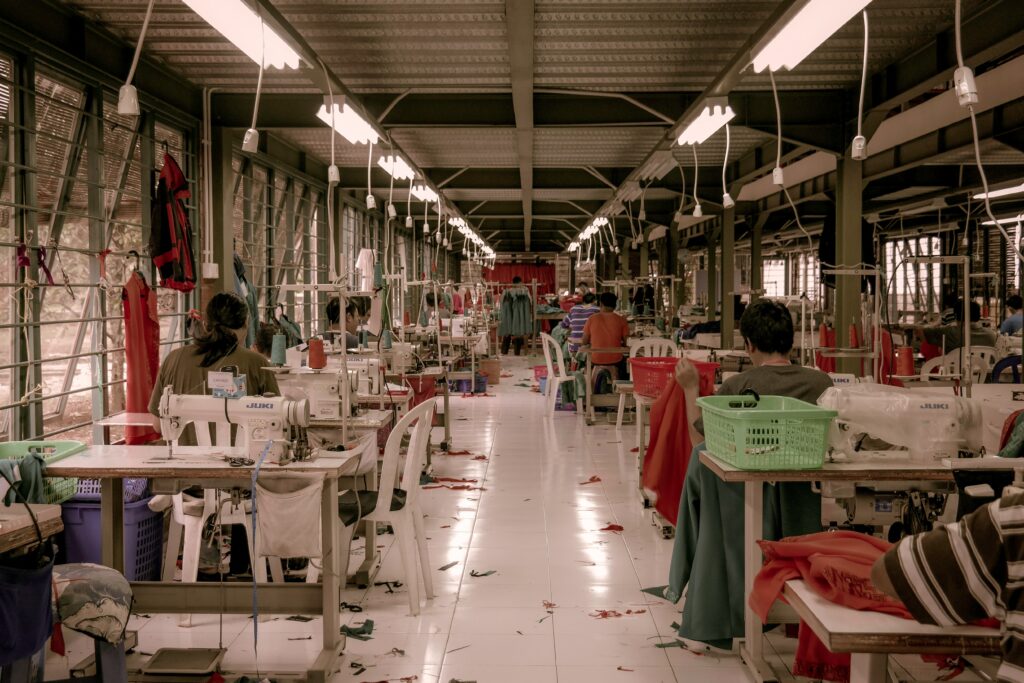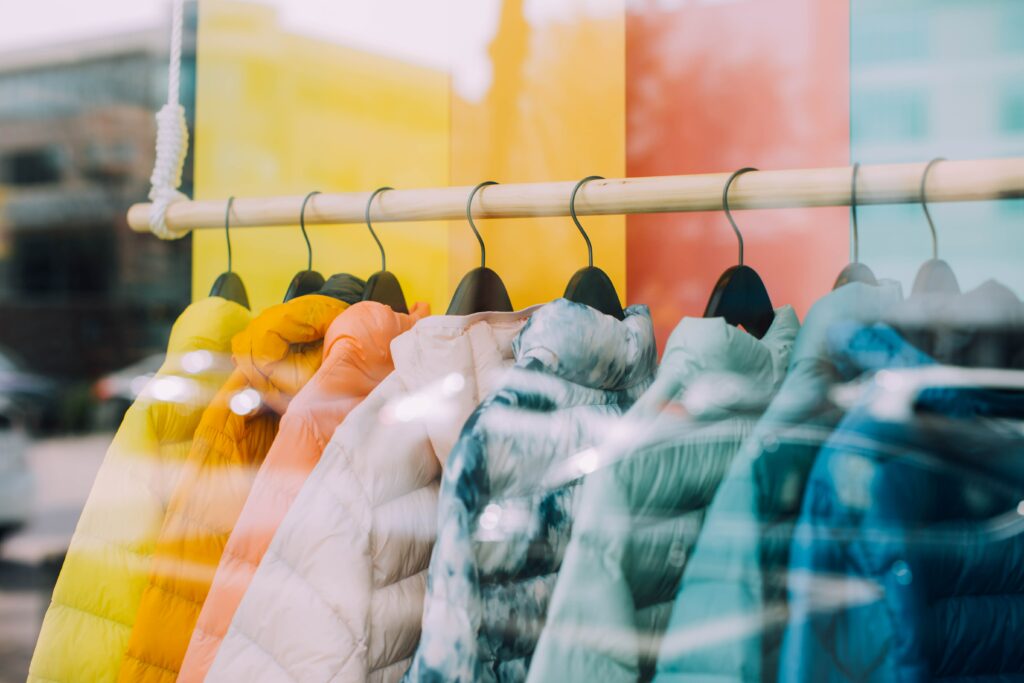Fashion is one of the most labour-dependent industries in the world, as each piece of apparel travels through a complex supply chain.
However, lack of visibility further down the chain has led the fashion industry to become the second-largest sector, after technology, to support modern slavery.
We’re here to tell you where it happens, why there is modern slavery and forced labour in fashion, and what you can do about it.

Where does modern slavery in fashion occur?
From the pickers harvesting the cotton to the yarn spinners and the workers manufacturing the garments – slavery and exploitation exists at all stages in the making of our clothes.
Across the garment and textile industry, exploitation includes:
- forced labour
- little or no pay
- paying in order to maintain employment
- working long hours and being locked into factories
- lack of, or inadequate, contracts
- lack of workers’ rights, including the right to organise and bargain collectively
- lack of social benefits such as healthcare, sick pay or pensions.
Such conditions are especially prevalent in the major cotton- and garment-producing countries.
Human rights organisations have documented considerable evidence of forced and child labour operating in countries like China and India (who produce nearly half of the world’s cotton between them), Bangladesh, Turkmenistan and Uzbekistan.
One fifth of the world’s cotton comes from Xinjiang, China, where there is significant evidence of forced labour specifically related to cotton picking.
Lack of workers’ rights means these workers have little to no power over employers to challenge exploitative practices and demand better conditions.
But conditions within the UK garment sector are also poor. In June 2020 Labour Behind the Label published evidence exposing forced labour in Leicester’s garment factories.
The report revealed that workers in these factories were paid as little as £3 an hour and forced to work without social distancing measures during Covid-19 lockdowns.
And in 2021, 10% of cases reported to the Modern Slavery & Exploitation Helpline related to businesses in the garment sector*.

Why is there modern slavery in fashion?
Elements of the fashion industry have engendered a “race to the bottom”, where companies push for the lowest costs from their suppliers to maximise profits.
With such pressure on the supply chain, corners are inevitably cut, such as subcontracting to unaudited and unknown suppliers.
It’s also the perfect climate for exploitative practices including poor working conditions and low wages.
Understanding supply chains
Due to the complex nature of the industry’s supply chain, visibility beyond the first tier is difficult – and this poses issues for both businesses and consumers alike.
According to a recent report by Sheffield Hallam University, more than 100 international retail brands could be at high risk of using cotton that is produced by forced labour in the Xinjiang region, China.
While some governments have prohibited the importing of such cotton, the report identified 53 contract garment suppliers across Asia that obscure the cotton’s origins, before it makes its way into the hands of unwitting consumers.
It’s a perfect example of how slavery remains hidden, yet close to all our lives.
In fact, alarmingly, the 2023 Global Slavery Index report says that $147.9 billion worth of garments and $12.7 billion worth of textiles are at risk of being produced by forced labour are imported annually by G20 countries.

Companies and the Modern Slavery Act
Section 54 of the UK Modern Slavery Act states that all UK businesses with a global annual turnover of £36 million must report on the steps they are taking to ensure their goods and services are slave free.
While this was a huge step forward in the development of corporate social responsibility, there are still gaps that need amending including:
- There are no standards for what constitutes sufficient due diligence.
- The Act does not require UK companies to report on the supply chains of wholly owned subsidiaries abroad.
- The lack of effective enforcement provides little incentive for qualifying businesses to engage with the Act.
The result is an Act that falls short of ensuring transparency, and few legal ramifications for businesses that have modern slavery in their supply chains.
For more support in your approach to modern slavery, contact our Business Engagement Team.
What can fashion businesses do about modern slavery?
Many retailers are not taking enough action against exploitation and slavery, despite legal obligations.
Findings from the 2021 Fashion Transparency Index shows that the majority of major brands still withhold vital data on human rights issues such as worker pay, worker conditions, purchasing practices, and racial and gender inequality.
If companies are serious about tackling modern slavery, then they need to look beyond their top tier suppliers.
Understanding the full scale of the issue involves conducting traceability assessments of all their product’s ingredients, right down to the raw material.
On a local level, there are practical steps that companies can take to raise awareness and address risks, too.
For starters, we recommend promoting the Modern Slavery & Exploitation Helpline number (08000 121 700).
It is also absolutely essential to provide effective training to staff: ensuring a fundamental understanding of the issues and how to spot the signs of modern slavery.
Companies should also use their leverage with suppliers to ensure they’re taking steps to tackle exploitation, whether that be insisting upon training as part of working together, or asking suppliers to comply with UN Sustainable Development Goals (SDGs).
“Exploitation within the fashion industry’s supply chains is endemic,” says Thea Cooper, Business Account Manager at Unseen. “It’s therefore crucial that brands take responsibility, even if that means addressing issues on a local level.
“Unseen’s Helpline Business Portal can alert organisations to reports of exploitation within their supply chains and act as an early warning sign to issues.”
Unseen works with a number of major retail brands, including Boohoo, JD Sports, Next and Marks and Spencer.
However, we realise that in order to bring systemic change in the fashion industry, we can’t just rely on big businesses to do their bit.
That’s why we have launched a free toolkit to support small and medium enterprises in tackling modern slavery.
For more support in your approach to modern slavery, contact our Business Engagement Team.
What can consumers do about modern slavery?
Although it’s widely recognised that businesses need to take the lead in addressing issues in supply chains, consumers also have the power to act:
Do your research to find out whether your favourite brands have a modern slavery statement – it will usually be on the home page of their website – and if they don’t, write to them and ask why.
You can track the performance of your favourite brands using Ethical Consumer and Fashion Transparency Index, to help you make more informed decisions.
Vote with your wallet. There is power in purchasing. By choosing to shop ethically and sustainably, you can encourage more companies to take responsibility.
*Statistic has been collated from the analysis of eight sectors


